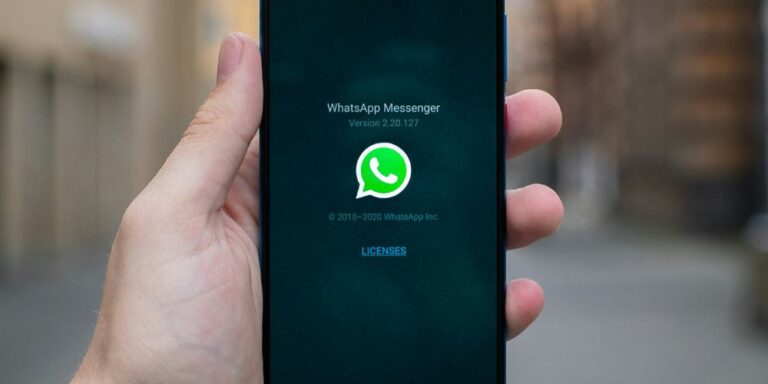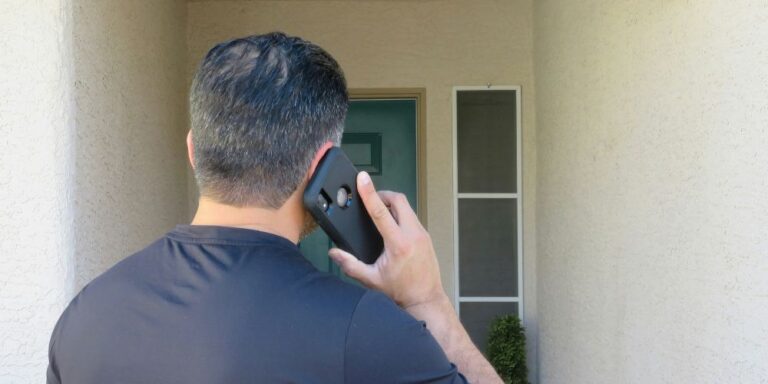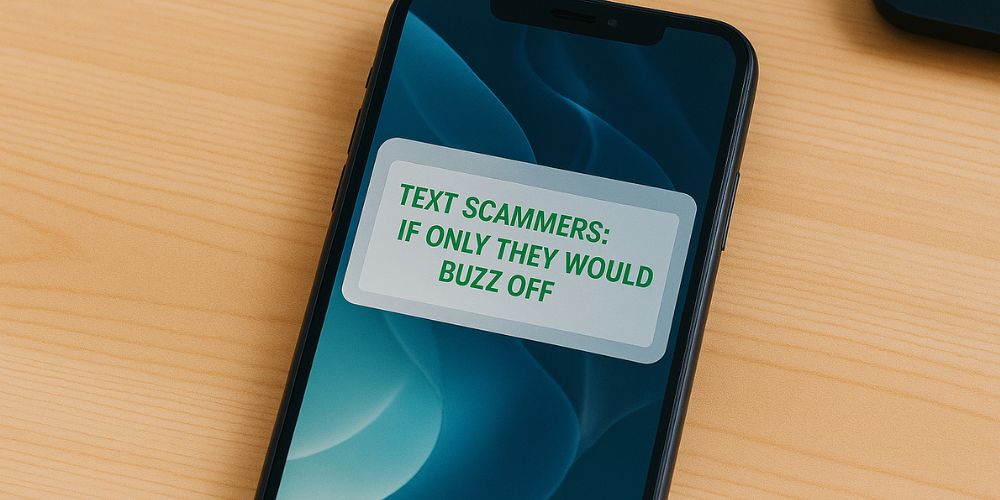I’m sitting in my living room, enjoying the Wimbledon Men’s final. Sinner and Alcaraz are putting on a great show. What an outstanding match. A real nail-biter. I take a sip of my Corona, and put my feet up. I’m having a lovely, relaxing Sunday night. Then my phone buzzes. Probably just a mate. I pick up my phone, take a glance, and what do you know? Every ounce of chill just evaporates from my body. A panic casts over me like a heavy blanket. I’ve just seen a handful of anxiety-inducing words packed inside my text notification that sent me into a brief state of terror. Thankfully, it turns out there’s nothing to worry about. It just looked scary. But what could have possibly shaken me out of my state of relaxation? One of those text scammers, of course.
Terrifying at a glance
These scammers know exactly what they’re doing. What’s the best way to inspire someone to take quick action without thinking too hard about it? Get them to respond emotionally. And what emotions work best for this sort of thing? Panic. Guilt. Fear. These criminals have carefully crafted the perfect text message scam, wrapped in just enough scary words and worrying implications to convince people to click the link without giving it much thought.
The ones I’ve been getting a lot lately (and I mean three or four a week – it’s getting bad) are mostly spinning some story about parking violations. Your eyes are immediately drawn to the “scary words” first, which gets your heart racing.
“Parking fine”, “unpaid ticket”, “legal action”, “prosecution”, “court”… you know the sort.
Scammers know that by posing as some kind of official government authority, scolding you about a so-called “unpaid parking violation”, and prompting you to pay it or face a court hearing, your first instinct will be to panic.
What do these text scammers want from you?
Most of the time, like clockwork, these texts will have a dodgy-looking link somewhere in there. The sender will tell you it’s a link to add a payment method to complete delivery of a parcel, or pay an unpaid fine, or some other nonsense lie. If the misleading information preceding the link doesn’t give it away, the link itself probably will. Chances are, it won’t resemble a website URL you’d recognise, and will probably look like a load of gibberish. (It’s worth saying, though, that you should exercise caution if it looks legitimate – scammers are getting smarter with that kind of thing.) This link will take you to a page that will ask for details of some description, whether that be login credentials or payment information. Don’t give it to them. Don’t click that link!

How do you recognise a text scam?
Thankfully, I’m one of the growing number of people who know what to trust and what not to, as well as what the giveaways to look out for are in scams like this. Otherwise, if I had been a member of the more vulnerable groups who aren’t as aware, I may have taken the bait. So, what are some of the most glaring giveaways?
First of all, the grammar in these texts is rarely perfect. There’s usually a typo or two, some misused punctuation, some awkward spacing or misplaced capitalisation – something that gives it away as an amateur attempt at passing as official.
Secondly – and this is one that I’ve noticed personally lately – these sometimes happen as part of a bulk text. You’ll be able to see all recipients of the text (revealing numerous phone numbers, which is a data protection problem in and of itself), which gives away that this is just a cyber criminal casting a wide net. If you were to be contacted about an unpaid parking violation, or a parcel that needed additional payment to be delivered, why would they contact a bunch of people all at once, revealing their numbers to each other?
Finally, always look at the number the message is being sent from. It’s probably a random unverified mobile number. One quick Google search of the company the sender is claiming to represent (or of the phone number itself) will quickly prove or disprove their claims.
Social media hackers are still abundant
I’ve also been on the receiving end of a few social media scams lately – one of which I accidentally entertained for a little too long before realising what was happening.
One of these was a classic I hadn’t seen for a while. I’d received a message from a Facebook friend I hadn’t spoken to in years, and was never really that close to (which was the first red flag), claiming that they’d just seen me in a video. They posted a link to the “video”, which, surprise, surprise, wasn’t a link to YouTube or TikTok or anything. They didn’t get a click from me. That person had, of course, had their account hacked, and the person responsible was trying to catch out their unsuspecting friends.
The other was something I hadn’t encountered before. I had a message on Twitter (or X… but I still call it Twitter) from a random user claiming that they had mistakenly mass reported my account, confusing it for someone else who had scammed them out of their bank details. They apologised profusely, and said that they had heard from the support team that due to these reports, my account was set to be taken down. I felt sorry for this person, and told them that I hoped they’d manage to sort things with their bank.
But then… the user sent me an almost-convincing screenshot of an email from “X Support” stating that my account was to be deleted soon following the reports. The “email” provided a WhatsApp number of a random support team member to message if I wanted to appeal the decision. And that’s when I finally caught on. I don’t know for sure what would have happened if I had texted this number, but my guess is they would have asked for my account login details or something of that nature. I replied to the user telling them I’d just figured out what they were doing, and… they blocked me.

These scams are getting more frequent
Have you noticed a sharp increase in how often you receive these spam messages, emails and calls in the last few years? I have, too. And it’s not just a gut feeling; the statistics back this up, too.
According to a study by YouGov in June 2024, which surveyed over 2,000 adults, the percentage of people on the receiving end of scam texts and emails shot up from 92% in 2022 to 96% last year. The percentage of those receiving them more than once weekly also rose – from 34% in 2022 to 37% in 2024.
Keep a level head
What these scammers want is for you to respond to these scams in an instinctive panic, without thinking too long and hard about the likely authenticity of the message you’ve received. So don’t give that to them! Always remember to check the phone number, the grammar, the link, and whether the message is sent to multiple recipients. Odds are, you won’t be sent a legitimate text message at random about a parking fine or undelivered parcel, so if you get any messages like that, I’m fairly sure they can be dismissed.
We’ve written previously about other common scams and how to watch out for them, so give that a read if you want to be even more vigilant.
And now, maybe next time you receive a scary-looking message while you’re watching tennis, you won’t pay it any mind. At least, that’s my goal.





